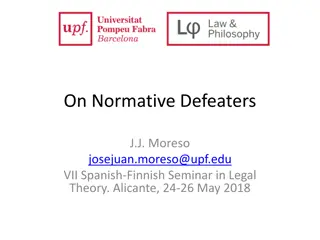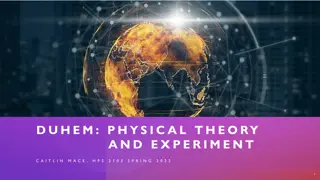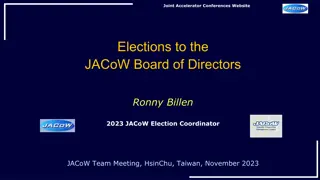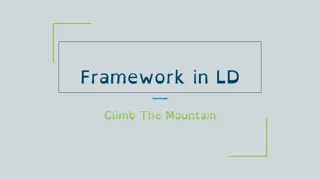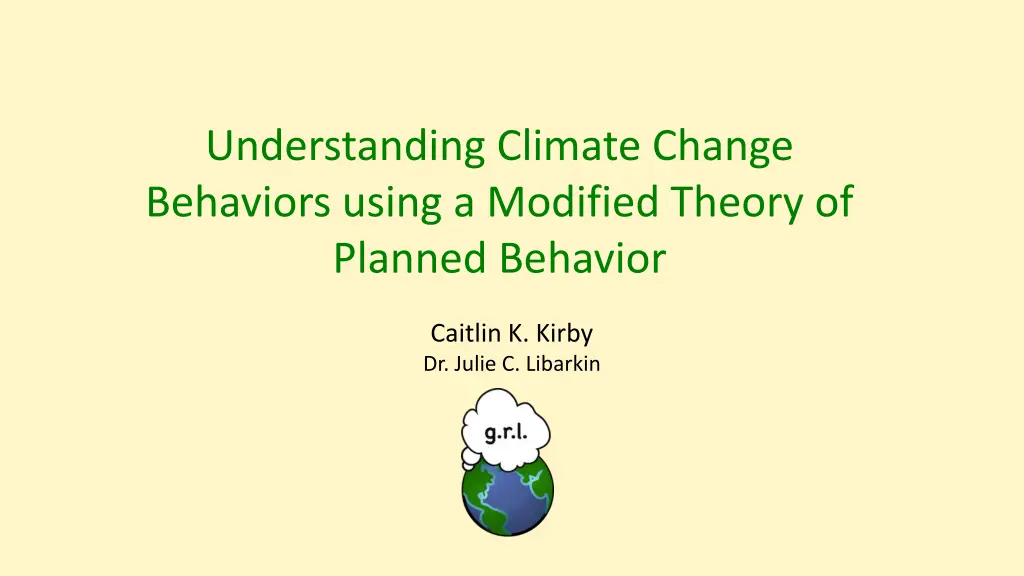
Understanding Climate Change Behaviors Using Modified Theory of Planned Behavior
Explore the determinants of pro-environmental behavioral intentions in undergraduates through a modified Theory of Planned Behavior. Dive into survey developments on environmental behaviors, attitudes, subjective norms, perceived behavioral control, values, beliefs, and norms related to climate change actions.
Download Presentation

Please find below an Image/Link to download the presentation.
The content on the website is provided AS IS for your information and personal use only. It may not be sold, licensed, or shared on other websites without obtaining consent from the author. If you encounter any issues during the download, it is possible that the publisher has removed the file from their server.
You are allowed to download the files provided on this website for personal or commercial use, subject to the condition that they are used lawfully. All files are the property of their respective owners.
The content on the website is provided AS IS for your information and personal use only. It may not be sold, licensed, or shared on other websites without obtaining consent from the author.
E N D
Presentation Transcript
Understanding Climate Change Behaviors using a Modified Theory of Planned Behavior Caitlin K. Kirby Dr. Julie C. Libarkin
Research Question Which determinants of a modified Theory of Planned behavior are most important in predicting pro- environmental behavioral intentions in undergraduates?
Survey Development Four environmental behaviors
Survey Development Theory of Planned Behavior (Ajzen, 1991) Attitudes Behavioral Intentions Subjective Norms Behavior Perceived Behavioral Control Attitude: I think recycling is important
Survey Development Theory of Planned Behavior (Ajzen, 1991) Attitudes Behavioral Intentions Subjective Norms Behavior Perceived Behavioral Control Subjective norms: People who are important to me expect me to recycle.
Survey Development Theory of Planned Behavior (Ajzen, 1991) Attitudes Behavioral Intentions Subjective Norms Behavior Perceived Behavioral Control PBC: If I wanted, I could recycle during the next 6 months.
Survey Development Values-Beliefs-Norms (Stern et al. 1999) Biospheric Values Ecological Worldview Personal Norms Behavior Egoistic Values Biospheric values: Respecting the Earth: Harmony with other species
Survey Development Values-Beliefs-Norms (Stern et al. 1999) Biospheric Values Ecological Worldview Personal Norms Behavior Egoistic Values Egoistic values: Wealth: Material possessions, money
Survey Development Values-Beliefs-Norms (Stern et al. 1999) Biospheric Values Ecological Worldview Personal Norms Behavior Egoistic Values Personal norms: I feel a strong moral obligation to recycle.
Survey Development Knowledge of Climate Change ? Behavioral Intentions Knowledge 1. How has the amount of carbon dioxide in the atmosphere changed since the start of the Industrial Revolution 150 years ago? A. The amount of carbon dioxide has remained the same. B. The amount of carbon dioxide has decreased. C. The amount of carbon dioxide has increased. D. I do not know.
Attitudes Biospheric Values Subjective Norms Egoistic Values Behavioral Intentions Personal Norms Perceived Behavioral Control Knowledge
Survey Dissemination Undergraduate students in general education science labs Fall 2016-Spring 2017 n=132
Students Behavioral Intentions 90 80 Number of Students (n=132) 70 60 Recycle 50 Vote 40 Write 30 Donate 20 10 0 Strongly Disagree Disagree Agree Strongly Agree
Students Behavioral Intentions 90 80 Number of Students (n=132) 70 60 Recycle 50 Vote 40 Write 30 Donate 20 10 0 Strongly Disagree Disagree Agree Strongly Agree
Climate Change Knowledge 50 45 Average: 47% 40 Number of Students 35 30 25 20 15 10 5 0 0 1 2 3 4 5 Number of Questions Correct
Structural Equation Modeling Attitudes Biospheric Values Subjective Norms Egoistic Values Behavioral Intentions Personal Norms Perceived Behavioral Control Knowledge
Structural Equation Modeling Attitudes 0.50** * p<0.05 ** p<0.001 Biospheric Values 0.38** Subjective Norms 0.30** Egoistic Values 0.47** Behavioral Intentions 0.45** Personal Norms Perceived Behavioral Control 0.12* Knowledge
Resulting Behavior Model * p<0.05 ** p<0.001 Subjective Norms 0.38** 0.30** Biospheric Values 0.47** Behavioral Intentions 0.45** Personal Norms 0.12* Perceived Behavioral Control
Highlighting Norms Group work around climate behaviors Increased subjective norms Activating personal norms Consequences and responsibility
Conclusions Norms inform public sphere environmental behavior Knowledge does not impact these behaviors Students need opportunities to explore values, norms, and behaviors around socioscientific issues
Acknowledgements and Contact This work was funded by Michigan State University s Office of Sustainability Be Spartan Green Grant. Any Opinions, findings and conclusions or recommendations expressed in this material are those of the author(s) and do not necessarily reflect those of the Office of Sustainability. @kirbycai kirbycai@msu.edu
Behavior Model for Recycling * p<0.05 ** p<0.001 Subjective Norms 0.26* Recycling Behavioral Intentions Perceived Behavioral Control 0.41** Requires structural components in place Individual level behavior
Survey Development Seven Independent Variables Attitude: I think recycling is important Subjective Norm: People who are important to me expect me to recycle. Personal Norm: I feel a strong moral obligation to recycle. Perceived Behavioral Control: If I wanted, I could recycle during the next 6 months. Biospheric Values: Respecting the Earth: Harmony with other species Egoistic Values: Wealth: Material possessions, money Climate Change Understanding: 5 knowledge questions Dependent Variable: Behavioral Intentions I intend to, always or in most instances, recycle in the next 6 months.
Item Factor Loadings 0.747 0.753 0.635 0.733 Attitude: Recycle Attitude: Write Attitude: Donate Attitude: Vote PBC: Recycle PBC: Write PBC: Donate PBC: Vote Subjective Norm: Recycle Subjective Norm: Write Subjective Norm: Donate Subjective Norm: Vote Behavioral Intention: Recycle Behavioral Intention: Write Behavioral Intention: Donate Behavioral Intention: Vote Personal Norm: Recycle Personal Norm: Write Personal Norm: Donate Personal Norm: Vote Cronbach's Alpha 0.433 0.68 0.641 0.651 0.684 0.814 0.776 0.783 0.388 0.824 0.754 0.419 0.604 0.822 0.777 0.637 0.806 0.796 0.691 0.849 0.7
Climate Change Knowledge Questions 1. How has the amount of carbon dioxide in the atmosphere changed since the start of the Industrial Revolution 150 years ago? A. The amount of carbon dioxide has remained the same. B. The amount of carbon dioxide has decreased. C. The amount of carbon dioxide has increased. D. I do not know. 2. Which of the following best describes how plants take in carbon dioxide? A. Plants take in carbon dioxide from rain. B. Plants take in carbon dioxide from sunlight. C. Plants take in carbon dioxide from air. D. Plants take in carbon dioxide from soil. E. I do not know.
Climate Change Knowledge Questions 3. Which is the most common form of radiation given off by Earth's surface? A. The Earth s surface mostly gives off visible radiation. B. The Earth s surface mostly gives off infrared radiation. C. The Earth s surface mostly gives off ultraviolet radiation. D. Earth s surface does not give off radiation. E. I do not know. 4. Which is the best definition of a positive feedback loop in the climate system? A. A change in the climate system leads to a response that benefits climate change. B. A change in the climate system leads to a response that slows down climate change. C. A change in the climate system leads to a response that speeds up climate change. D. A change in the climate system leads to a response that harms climate change. E. I do not know.
Climate Change Knowledge Questions 5. Averaged over long time periods, how does the amount of energy arriving from space compare to the amount of energy leaving Earth? A. The amount of energy arriving from space is greater than the amount of energy leaving Earth. B. The amount of energy arriving from space is less than the amount of energy leaving Earth. C. The amount of energy arriving from space is roughly equal to the amount of energy leaving Earth. D. I do not know.











